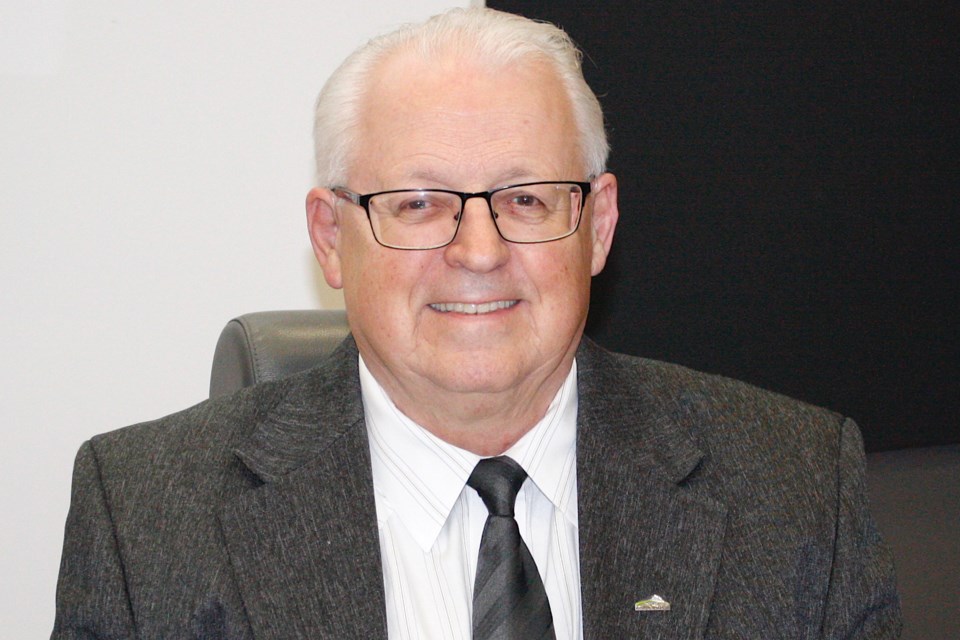SUNDRE – The municipality’s mayor welcomed the provincial government’s plan to reduce the interest rate on debenture borrowing.
Richard Warnock was offering his thoughts on the Alberta Municipalities three-day convention that was held late in September in Red Deer, when the premier among other announcements stated the government’s intention to reverse next year a previous rate hike on capital project loans for municipalities.
Sundre’s mayor said, drawing his estimates from a capital project the town has planned for Centre Street North in 2026 that is estimated to run a cost in excess of $3 million, that could save the municipality upward of approximately $20,000 a year.
“That’s a half a mill rate,” Warnock told the Albertan on Oct. 2 during a phone interview.
He clarified that while the project is included among the town’s capital plans for the coming years, that it has technically yet to come before council for official approval on how it will be funded. That being said, Warnock estimated the required amount of borrowing for that project could run upwards of $2 million. He added the project will be put out for tender when the time comes.
Aside from other speeches from sitting government officials as well as members of the Opposition, the convention of course otherwise revolved largely around the many proposed resolutions that were voted on.
“There was a tremendous amount of debate and discussions,” said Warnock, adding 14 resolutions were adopted as presented while five were adopted with amendments with two being defeated outright and six remaining outstanding.
The majority of the proposed resolutions were so well worded that essentially “nobody would vote against them,” he said.
“That’s why you had 14 of them that were approved as presented.”
“But the others took some time,” he added.
One such resolution that ended up being discussed at great length was the proposal to advocate the provincial government for the expansion of municipal voting rights to include permanent residents who for years have lived, worked, and paid taxes in their communities.
“There was a lot – a lot – of debate on that one on both sides of the argument,” said Warnock, adding the resolution was one of the two that were ultimately defeated.
“It was a narrow margin.”
Warnock said that resolution was defeated with many people who voted against it identifying as citizen immigrants who were previously permanent residents that went through the process to become Canadians to earn the right to vote.
“And then of course there was the argument from the other side that permanent residents do a lot for our municipalities and our communities,” he added.
- RELATED: Sundre council discusses possible expansion of municipal voting rights
- RELATED: Alberta municipal leaders squash advocacy for permanent resident voting rights
The resolution being defeated of course does not mean it could not be reworded and reconsidered in the future, nor would its passing have actually guaranteed the sought-after change would officially be implemented by the provincial government.
“It would absolutely not have changed anything,” he said. “All these resolutions are what we’re going to lobby for.”
Regarding the resolutions that did pass, the mayor said he wasn’t worried about any potential adverse effects on the municipality.
“So many of these had no relevance to the town of Sundre,” he said.
But he did see potential benefits for Sundre in some of them should they end up actually being adopted by the government.
Among them was a resolution to advocate the province to restore grants in lieu of taxes. Although a fairly minor matter for Sundre, where such a change would apply only to the Fish and Wildlife office because of the provincial taxes that are paid for government facilities situated within a municipality, the mayor said he intends to keep an eye on that file over the year ahead to see if any changes that go through could have an impact on the town.
Additionally, he cited the resolution advocating for a funding increase to Family and Community Support Services as a clear benefit to Sundre or any municipality for that matter if the government were to follow through.
“That passed with a high percentage,” he said.
Another sensible resolution that was essentially fully supported was a call for the government to increase mental health support for first responders.
“A lot of people were really in support of that happening, which could have a big benefit for Sundre,” he said.
“Our medical teams and our fire department, our medical assist units, are always the first ones on the scene.”
As well, there seemed to be widespread support to advocate for a wildfire prevention committee, which for municipalities such as Sundre that are situated amid a wildland urban interface could also prove beneficial.
“Wildfires are the topic these days,” he said. “So there’s big support for lobbying for a wildfire prevention committee for the province.”



